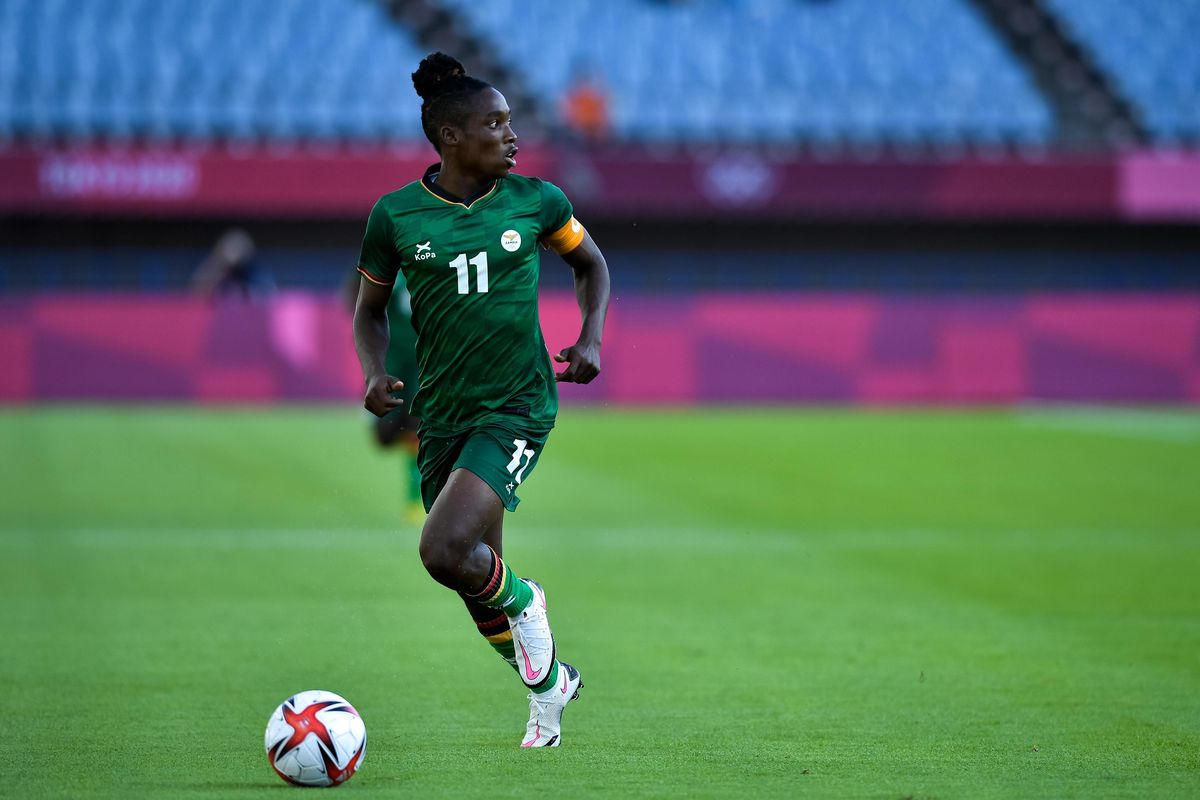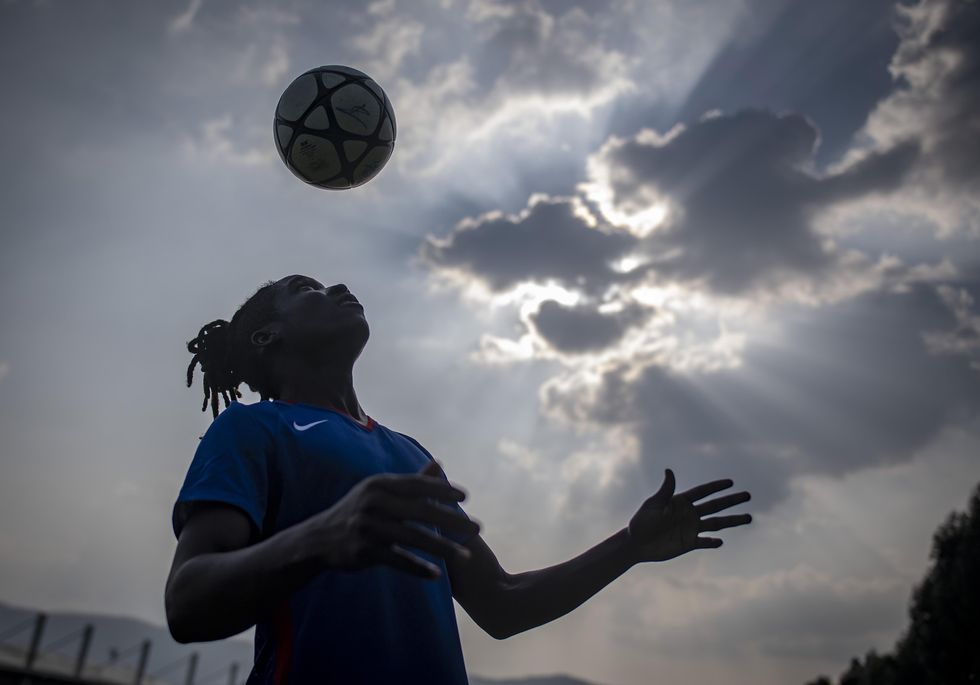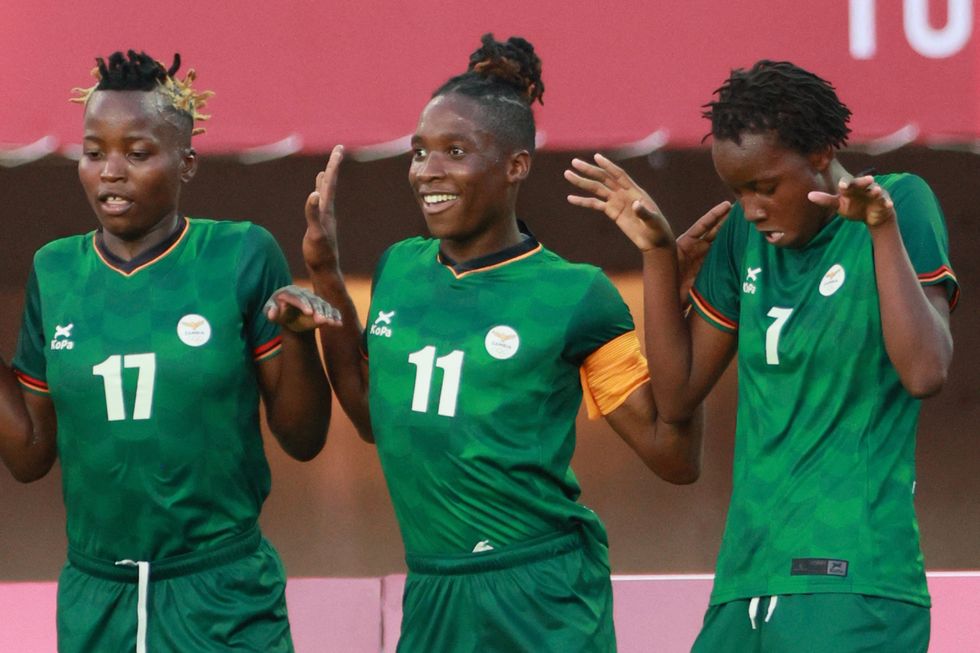The Barbra Banda Ban Shows Black Women Aren't Allowed to Be Too Strong
Failing to meet gender protocols, the Zambian captain was dropped ahead of WAFCON. In African female football, there needs to be a case for bodily integrity.

In Morocco, the 2022 Women’s Africa Cup of Nations (WAFCON) has begun. Ruled out from the competition is Zambia’s captain Barbra Banda, after failing eligibility tests to prove her gender. These tests align with FIFA regulations, which the Confederation of African Football (CAF) is obligated to follow. Originally named in Zambia’s WAFCON squad, the 22-year-old forward had been on medication to reduce her naturally high testosterone levels. Yet, she didn’t meet the criteria from CAF.
Banda has been a star player for Zambia’s national team since debuting at the FIFA U-17 Women’s World Cup. At the Tokyo 2020 Olympics, she became the first player to score two consecutive hat-tricks in the history of the Olympic Games. Also, she was the top scorer in the Chinese League in the same year, scoring 18 goals in 13 matches for the Shanghai Shengli.
Here’s a player whose trajectory on the continent is being derailed. But how did we get here?

Photo Credit: Jiang Wenyao/Xinhua via Getty
Africa’s football governing body has a responsibility to ensure fairness and equality. But it’s necessary to understand what undergirds these gender tests. On the surface, it became a policy after Equatorial Guinea hosted and won the African Women’s Championship in 2008 when their victory was tainted with claims from Nigeria and Cameroon that two of their players were men.
CAF introduced “femininity testings” in 2011, collaborating with national associations. Sanctioned by FIFA, professional female footballers were expected to undergo gender evaluations before tournaments. In the light of Banda’s exclusion from WAFCON, these regulations continue to emphasize the tumultuous relationship between gender and sports. More than that, it upholds a colonial reasoning that punishes Black people for failing to enter neat categories of gender.
Gender verification in women’s sports has a long, convoluted history. Esteemed bodies like the International Olympic Committee (IOC), and the International Amateur Athletic Federation (IAAF), have been advancing methods to maintain “female purity” in women’s competitions. This simplistic logic has racist and misogynistic undercurrents, formulated centuries ago from the corridors of European science to justify colonial domination over Black people and sexist discrimination against white women.
Several intersecting fields of western inquiry have created a pathology and hysteria around manhood and womanhood and who should be excluded from it. In the 19th century, a developing intellectual canon mapped out gender as binary, including biological sex. To make the gender binary work, physical traits, hormones, chromosomes, genitalia and other characteristics had to be seen as either exclusively male or female. Existing outside of the binary was to be seen as abnormal or freakish.
As a linchpin of white supremacy, the gender binary continues to be reified in a way that female masculinity becomes grotesque. Black women face a peculiar demonization. Banda has hyperandrogenism. In this case, women are observed to have high levels of androgen. In other words, they produce testosterone more than what’s considered abnormal for women. In the medical sense, this refers to AIS (Androgen Insensitivity Syndrome).
Per CAF stipulations, this is why she went on hormone treatment to reduce her elevated levels of testosterone. We aren’t privy to her current testosterone status. Following CAF’s verdict, it raises important questions about anti-Black surveillance in sports and Black women’s relationship with testosterone.
In the view of CAF, women can be strong, but not too strong.

Photo Credit: Kohei Chibahara / AFP
On whether female athletes with high testosterone levels have a competitive advantage over their peers, research and theories have shown that this isn’t straightforward. In addition, natural endowments have given certain people an advantage in sports. Why weren't there rulings to alter these characteristics? The racial double standard of decorated swimmer Michael Phlelps, who wasn’t asked to increase his lactic acid, comes to mind. So is the reality that basketball doesn't have height divisions.
Banda is in a team sport where players make contributions based on individual talent and skill. In the grand scheme of things, why must her input be solely seen through the lens of a hormone and not hard work and practice? An athlete who isn’t a stranger to vilification and smear campaigns in sports is Caster Semenya. For years, this embattled South African athlete has been caught in the crossfire of scrutiny from sports governing bodies and the public in order to prove that she’s really a woman.
In 2021, two Namibian athletes, Christine Mboma and Beatrice Masilingi, failed to meet the criteria for female classification in the Olympics. It led to their withdrawal from the 400m running events. As much as these incidents spark outrage on social media, it has amplified the rhetoric of several groups with a stake in transphobia, from alt-right conservatives to anti-trans feminist circles. Testosterone testing on female athletes today holds up a mirror to the transphobic panic amongst “natural-born” women.
The prejudice against trans women — with visual judgment informed by the presence of idealized feminine aesthetics, or lack thereof — has crossed over into the domain of policing women who aren’t trans. It's an inevitable outcome of transphobia. Banda isn’t trans, but the actions from CAF imply that she’s a suspect of committing gender fraud.
African national football associations should care enough about gender politics and how it impacts the well-being and functioning of female footballers. They should see how their collaboration with CAF sends an overarching message: that only men can be the paragon of athleticism and performance. Upending colonial gender is a tall order, but diplomatic confrontations with CAF like close-door meetings is a start.
When these measures fail, female footballers should get support from their teams and supporters as they protest for bodily integrity.
- TikTok Shoots Its Shot at the Africa Cup of Nations - OkayAfrica ›
- Ivory Coast Will Host the Africa Cup of Nations in 2023 - OkayAfrica ›
- The Rwandan Woman Who Made Football History - OkayAfrica ›
- Everything You Need to Know About the 2023 FIFA Women’s World Cup - Okayplayer ›
- Kenyan Parliament Considers Petition Urging Ban on TikTok - Okayplayer ›
- When is a Woman in Appropriate Shape to be Considered a Proper Athlete? - Okayplayer ›
- Barbra Banda Named BBC Women’s Footballer of the Year 2024 - Okayplayer ›

